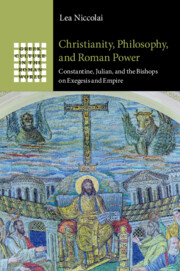 Christianity, Philosophy, and Roman Power
Christianity, Philosophy, and Roman Power Book contents
- Christianity, Philosophy, and Roman Power
- Greek Culture in the Roman World
- Christianity, Philosophy, and Roman Power
- Copyright page
- Dedication
- Epigraph
- Contents
- Figures
- Preface
- Acknowledgements
- Abbreviations, Editions, and Translations
- Introduction
- Part I At Constantius’ Court: Julian Caesar
- Part II Making and Breaking Constantine: Julian Augustus
- Chapter 3 Holy Hermeneutics
- Chapter 4 A Life for a Life
- Part III After Julian: Philosophy in the World
- Conclusions
- Bibliography
- Subject index
- Index Locorum
Chapter 3 - Holy Hermeneutics
from Part II - Making and Breaking Constantine: Julian Augustus
Published online by Cambridge University Press: 07 July 2023
- Christianity, Philosophy, and Roman Power
- Greek Culture in the Roman World
- Christianity, Philosophy, and Roman Power
- Copyright page
- Dedication
- Epigraph
- Contents
- Figures
- Preface
- Acknowledgements
- Abbreviations, Editions, and Translations
- Introduction
- Part I At Constantius’ Court: Julian Caesar
- Part II Making and Breaking Constantine: Julian Augustus
- Chapter 3 Holy Hermeneutics
- Chapter 4 A Life for a Life
- Part III After Julian: Philosophy in the World
- Conclusions
- Bibliography
- Subject index
- Index Locorum
Summary
Chapter 3 addresses the writings Julian composed during his sole rule (361–63) following Constantius’ sudden death. I suggest here that Julian’s mature output was grounded in the intuition that the challenge to Christian power had to be channelled into an attack on its identity as a superior interpretive system. The first section draws on a reading of key texts by Constantine and his supporters to contextualise Constantius’ intellectual self-image in the legacy of his father’s cultural policy. Constantine legitimised his subversive status as Christian emperor by projecting himself as the sublime exegete of divine providence. The second section illustrates the strategies Julian devised to deny the validity of Christianity’s hermeneutical claims, which he envisaged as prepared by Greek philosophical achievements and as being therefore derivative and unauthoritative. Julian’s critique was articulated through an attack on Christian exegesis (Against the Galileans) and on what Julian perceived as Christianity’s exploitative relationship with paideia (the School Ban). At the same time, Julian attempted to competitively rethink Greek allegoresis by renouncing the status of Homer as divine, enigmatic text and by composing hymns and writings constructing Greek religion as a ‘cult of culture’.
Keywords
- Type
- Chapter
- Information
- Christianity, Philosophy, and Roman PowerConstantine, Julian, and the Bishops on Exegesis and Empire, pp. 111 - 165Publisher: Cambridge University PressPrint publication year: 2023
